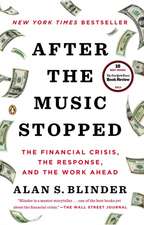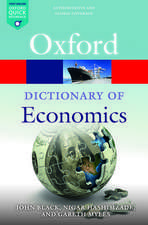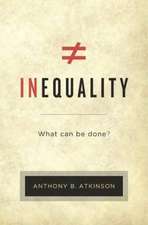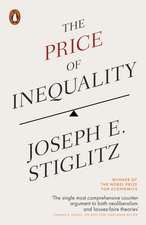Why Nations Fail: Crown Books
Autor Daron Acemoglu, James Robinsonen Limba Engleză Paperback – 31 iul 2013
Brilliant and engagingly written, Why Nations Fail answers the question that has stumped the experts for centuries: Why are some nations rich and others poor, divided by wealth and poverty, health and sickness, food and famine? Is it culture, the weather, geography? Perhaps ignorance of what the right policies are?
Simply, no. None of these factors is either definitive or destiny. Otherwise, how to explain why Botswana has become one of the fastest growing countries in the world, while other African nations, such as Zimbabwe, the Congo, and Sierra Leone, are mired in poverty and violence?
Daron Acemoglu and James Robinson conclusively show that it is man-made political and economic institutions that underlie economic success (or lack of it). Korea, to take just one of their fascinating examples, is a remarkably homogeneous nation, yet the people of North Korea are among the poorest on earth while their brothers and sisters in South Korea are among the richest. The south forged a society that created incentives, rewarded innovation, and allowed everyone to participate in economic opportunities. The economic success thus spurred was sustained because the government became accountable and responsive to citizens and the great mass of people. Sadly, the people of the north have endured decades of famine, political repression, and very different economic institutions—with no end in sight. The differences between the Koreas is due to the politics that created these completely different institutional trajectories.
Based on fifteen years of original research Acemoglu and Robinson marshall extraordinary historical evidence from the Roman Empire, the Mayan city-states, medieval Venice, the Soviet Union, Latin America, England, Europe, the United States, and Africa to build a new theory of political economy with great relevance for the big questions of today, including:
- China has built an authoritarian growth machine. Will it continue to grow at such high speed and overwhelm the West?
- Are America’s best days behind it? Are we moving from a virtuous circle in which efforts by elites to aggrandize power are resisted to a vicious one that enriches and empowers a small minority?
- What is the most effective way to help move billions of people from the rut of poverty to prosperity? More
philanthropy from the wealthy nations of the West? Or learning the hard-won lessons of Acemoglu and Robinson’s breakthrough ideas on the interplay between inclusive political and economic institutions?
Why Nations Fail will change the way you look at—and understand—the world.
Din seria Crown Books
-
 Preț: 96.71 lei
Preț: 96.71 lei -
 Preț: 172.89 lei
Preț: 172.89 lei -
 Preț: 202.37 lei
Preț: 202.37 lei -
 Preț: 233.06 lei
Preț: 233.06 lei -
 Preț: 180.64 lei
Preț: 180.64 lei -
 Preț: 154.84 lei
Preț: 154.84 lei -
 Preț: 181.46 lei
Preț: 181.46 lei -
 Preț: 93.63 lei
Preț: 93.63 lei -
 Preț: 150.76 lei
Preț: 150.76 lei -
 Preț: 178.17 lei
Preț: 178.17 lei -
 Preț: 83.44 lei
Preț: 83.44 lei -
 Preț: 107.43 lei
Preț: 107.43 lei - 16%
 Preț: 79.25 lei
Preț: 79.25 lei -
 Preț: 78.12 lei
Preț: 78.12 lei -
 Preț: 210.96 lei
Preț: 210.96 lei -
 Preț: 194.69 lei
Preț: 194.69 lei -
 Preț: 100.24 lei
Preț: 100.24 lei -
 Preț: 117.26 lei
Preț: 117.26 lei -
 Preț: 156.56 lei
Preț: 156.56 lei -
 Preț: 164.34 lei
Preț: 164.34 lei -
 Preț: 68.75 lei
Preț: 68.75 lei
Preț: 117.16 lei
Nou
22.42€ • 23.28$ • 18.70£
Carte disponibilă
Livrare economică 28 februarie-06 martie
Livrare express 15-21 februarie pentru 20.14 lei
Specificații
ISBN-10: 0307719227
Pagini: 529
Ilustrații: PHOTO INSERTS AND MAPS
Dimensiuni: 130 x 203 x 33 mm
Greutate: 0.42 kg
Editura: Crown Business
Colecția Crown Books
Seria Crown Books
Recenzii
"...bracing, garrulous, wildly ambitious and ultimately hopeful. It may, in fact, be a bit of a masterpiece."—Washington Post
“For economics and political-science students, surely, but also for the general reader who will appreciate how gracefully the authors wear their erudition.”—Kirkus Reviews
“Provocative stuff; backed by lots of brain power.”—Library Journal
“This is an intellectually rich book that develops an important thesis with verve. It should be widely read.” —Financial Times
“A probing . . . look at the roots of political and economic success . . . large and ambitious new book.” —The Daily
“Why Nations Fail is a splendid piece of scholarship and a showcase of economic rigor.” —The Wall Street Journal
"Ranging from imperial Rome to modern Botswana, this book will change the way people think about the wealth and poverty of nations...as ambitious as Jared Diamond's Guns, Germs, and Steel."
—Bloomberg BusinessWeek
“The main strength of this book is beyond the power of summary: it is packed, from beginning to end, with historical vignettes that are both erudite and fascinating. As Jared Diamond says on the cover: 'It will make you a spellbinder at parties.' But it will also make you think.” —The Observer (UK)
"A brilliant book.” —Bloomberg (Jonathan Alter)
“Why Nations Fail is a wildly ambitious work that hopscotches through history and around the world to answer the very big question of why some countries get rich and others don’t.” —The New York Times (Chrystia Freeland)
"Why Nations Failis a truly awesome book. Acemoglu and Robinson tackle one of the most important problems in the social sciences—a question that has bedeviled leading thinkers for centuries—and offer an answer that is brilliant in its simplicity and power. A wonderfully readable mix of history, political science, and economics, this book will change the way we think about economic development. Why Nations Fail is a must-read book." —Steven Levitt, coauthor of Freakonomics
"You will have three reasons to love this book. It’s about national income differences within the modern world, perhaps the biggest problem facing the world today. It’s peppered with fascinating stories that will make you a spellbinder at cocktail parties—such as why Botswana is prospering and Sierra Leone isn’t. And it’s a great read. Like me, you may succumb to reading it in one go, and then you may come back to it again and again." —Jared Diamond, Pulitzer Prizeߝwinning author of the bestsellers Guns, Germs, and Steel and Collapse
"A compelling and highly readable book. And [the] conclusion is a cheering one: the authoritarian ‘extractive’ institutions like the ones that drive growth in China today are bound to run out of steam. Without the inclusive institutions that first evolved in the West, sustainable growth is impossible, because only a truly free society can foster genuine innovation and the creative destruction that is its corollary." —Niall Ferguson, author of The Ascent of Money
"Some time ago a little-known Scottish philosopher wrote a book on what makes nations succeed and what makes them fail. The Wealth of Nations is still being read today. With the same perspicacity and with the same broad historical perspective, Daron Acemoglu and James Robinson have retackled this same question for our own times. Two centuries from now our great-great- . . . -great grandchildren will be, similarly, reading Why Nations Fail." —George Akerlof, Nobel laureate in economics, 2001
"Why Nations Fail is so good in so many ways that I despair of listing them all. It explains huge swathes of human history. It is equally at home in Asia, Africa and the Americas. It is fair to left and right and every flavor in between. It doesn’t pull punches but doesn’t insult just to gain attention. It illuminates the past as it gives us a new way to think about the present. It is that rare book in economics that convinces the reader that the authors want the best for ordinary people. It will provide scholars with years of argument and ordinary readers with years of did-you-know-that dinner conversation. It has some jokes, which are always welcome. It is an excellent book and should be purchased forthwith, so to encourage the authors to keep working." —Charles C. Mann, author of 1491 and 1493
“Imagine sitting around a table listening to Jared Diamond, Joseph Schumpeter, and James Madison reflect on over two thousand years of political and economic history. Imagine that they weave their ideas into a coherent theoretical framework based on limiting extraction, promoting creative destruction, and creating strong political institutions that share power and you begin to see the contribution of this brilliant and engagingly written book.” —Scott E. Page, University of Michigan and Santa Fre Institute
“This fascinating and readable book centers on the complex joint evolution of political and economic institutions, in good directions and bad. It strikes a delicate balance between the logic of political and economic behavior and the shifts in direction created by contingent historical events, large and small at ‘critical junctures.' Acemoglu and Robinson provide an enormous range of historical examples to show how such shifts can tilt toward favorable institutions, progressive innovation and economic success or toward repressive institutions and eventual decay or stagnation. Somehow they can generate both excitement and reflection.” —Robert Solow, Nobel Laureate in Economics, 1987
“It’s the politics, stupid! That is Acemoglu and Robinson’s simple yet compelling explanation for why so many countries fail to develop. From the absolutism of the Stuarts to the antebellum South, from Sierra Leone to Colombia, this magisterial work shows how powerful elites rig the rules to benefit themselves at the expense of the many. Charting a careful course between the pessimists and optimists, the authors demonstrate history and geography need not be destiny. But they also document how sensible economic ideas and policies often achieve little in the absence of fundamental political change.”—Dani Rodrik, Kennedy School of Government, Harvard University
“Two of the world’s best and most erudite economists turn to the hardest issue of all: why are some nations poor and others rich? Written with a deep knowledge of economics and political history, this is perhaps the most powerful statement made to date that ‘institutions matter.’ A provocative, instructive, yet thoroughly enthralling book.” —Joel Mokyr, Robert H. Strotz Professor of Arts and Sciences and Professor of Economics and History, Northwestern University
“A brilliant and uplifting book—yet also a deeply disturbing wake-up call. Acemoglu and Robinson lay out a convincing theory of almost everything to do with economic development. Countries rise when they put in place the right pro-growth political institutions and they fail—often spectacularly—when those institutions ossify or fail to adapt. Powerful people always and everywhere seek to grab complete control over government, undermining broader social progress for their own greed. Keep those people in check with effective democracy or watch your nation fail.” —Simon Johnson, co-author of 13 Bankers and professor at MIT Sloan
“This important and insightful book, packed with historical examples, makes the case that inclusive political institutions in support of inclusive economic institutions is key to sustained prosperity. The book reviews how some good regimes got launched and then had a virtuous spiral, while bad regimes remain in a vicious spiral. This is important analysis not to be missed.” —Peter Diamond, Nobel Laureate in Economics
“Acemoglu and Robinson have made an important contribution to the debate as to why similar-looking nations differ so greatly in their economic and political development. Through a broad multiplicity of historical examples, they show how institutional developments, sometimes based on very accidental circumstances, have had enormous consequences. The openness of a society, its willingness to permit creative destruction, and the rule of appear to be decisive for economic development.” —Kenneth Arrow, Professor Emeritus, Stanford University, Nobel Laureate in Economics, 1972
“Acemoglu and Robinson—two of the world's leading experts on development—reveal why it is not geography, disease, or culture which explains why some nations are rich and some poor, but rather a matter of institutions and politics. This highly accessible book provides welcome insight to specialists and general readers alike.” —Francis Fukuyama, author of The End of History and the Last Man and The Origins of Political Order
“Some time ago a little known Scottish philosopher wrote a book on what makes nations succeed and what makes them fail. The Wealth of Nations is still being read today. With the same perspicacity and with the same broad historical perspective, Daron Acemoglu and James Robinson have re-tackled this same question for our own times. Two centuries from now our great-great-…-great grandchildren will be, similarly, reading Why Nations Fail.” —George Akerlof, Nobel Laureate in Economics, 2001
“In this stunningly wide ranging book Acemoglu and Robinson ask a simple but vital question, why do some nations become rich and others remain poor? Their answer is also simple—because some polities develop more inclusive political institutions. What is remarkable about the book is the crispness and clarity of the writing, the elegance of the argument, and the remarkable richness of historical detail. This book is a must read at a moment where governments right across the western world must come up with the political will to deal with a debt crisis of unusual proportions.” —Steve Pincus, Bradford Durfee Professor of History and International and Area Studies, Yale University
“The authors convincingly show that countries escape poverty only when they have appropriate economic institutions, especially private property and competition. More originally, they argue countries are more likely to develop the right institutions when they have an open pluralistic political system with competition for political office, a widespread electorate, and openness to new political leaders. This intimate connection between political and economic institutions is the heart of their major contribution, and has resulted in a study of great vitality on one of the crucial questions in economics and political economy.” — Gary S. Becker, Nobel Laureate in Economics, 1992
“This not only a fascinating and interesting book: it is a really important one. The highly original research that Professors Acemoglu and Robinson have done, and continue to do, on how economic forces, politics and policy choices evolve together and constrain each other, and how institutions affect that evolution, is essential to understanding the successes and failures of societies and nations. And here, in this book, these insights come in a highly accessible, indeed riveting form. Those who pick this book up and start reading will have trouble putting it down.” ¯Michael Spence, Nobel Laureate in Economics, 2001
"In this delightfully readable romp through 400 years of history, two of the giants of contemporary social science bring us an inspiring and important message: it is freedom that makes the world rich. Let tyrants everywhere tremble!" —Ian Morris, Stanford University, author of Why the West Rules ߝ For Now
“Acemoglu and Robinson pose the fundamental question concerning the development of the bottom billion. Their answers are profound, lucid, and convincing.” ―Paul Collier, Professor of Economics, Oxford University, and author of The Bottom Billion
Notă biografică
DARON ACEMOGLU is the Killian Professor of Economics at MIT. In 2005 he received the John Bates Clark Medal awarded to economists under forty judged to have made the most significant contribution to economic thought and knowledge.
JAMES A. ROBINSON, a political scientist and an economist, is the David Florence Professor of Government at Harvard University. A world-renowned expert on Latin America and Africa, he has worked in Botswana, Mauritius, Sierra Leone, and South Africa.
Cuprins
C o n t e n t s
Preface
Why Egyptians fi lled Tahrir Square to bring down Hosni Mubarak
and what it means for our understanding of the causes of
prosperity and poverty
1.
So Close and Yet So Different
Nogales, Arizona, and Nogales, Sonora, have the same people,
culture, and geography. Why is one rich and one poor?
2.
Theories That Don’t Work
Poor countries are poor not because of their geographies or cultures,
or because their leaders do not know which policies will enrich
their citizens
3.
The Making of Prosperity and Poverty
How prosperity and poverty are determined by the incentives
created by institutions, and how politics determines what
institutions a nation has
4.
Small Differences and Critical Junctures:
The Weight of History
How institutions change through political confl ict and how
the past shapes the present
5.
“I’ve Seen the Future, and It Works”:
Growth Under Extractive Institutions
What Stalin, King Shyaam, the Neolithic Revolution, and the
Maya city-states all had in common and how this explains why
China’s current economic growth cannot last
6.
Drifting Apart
How institutions evolve over time, often slowly drifting apart
7.
The Turning Point
How a political revolution in 1688 changed institutions in
England and led to the Industrial Revolution
8.
Not on Our Turf: Barriers to Development
Why the politically powerful in many nations opposed the
Industrial Revolution
9.
Reversing Development
How European colonialism impoverished large parts of the world
10.
The Diffusion of Prosperity
How some parts of the world took different paths to prosperity
from that of Britain
11.
The Virtuous Circle
How institutions that encourage prosperity create positive feedback
loops that prevent the efforts by elites to undermine them
12.
The Vicious Circle
How institutions that create poverty generate negative
feedback loops and endure
13.
Why Nations Fail Today
Institutions, institutions, institutions
14.
Breaking the Mold
How a few countries changed their economic trajectory by
changing their institutions
15.
Understanding Prosperity and Poverty
How the world could have been different and how understanding
this can explain why most attempts to combat poverty have failed
Acknowledgments
Bibliographical Essay and Sources
References
Index
Descriere
Based on 15 years of original research, Acemoglu and Robinson marshal extraordinary historical evidence from the Roman Empire, the Mayan city-states, medieval Venice, the Soviet Union, Latin America, England, Europe, the United States, and Africa to build a new theory of political economy with great relevance for the big questions of today.



















